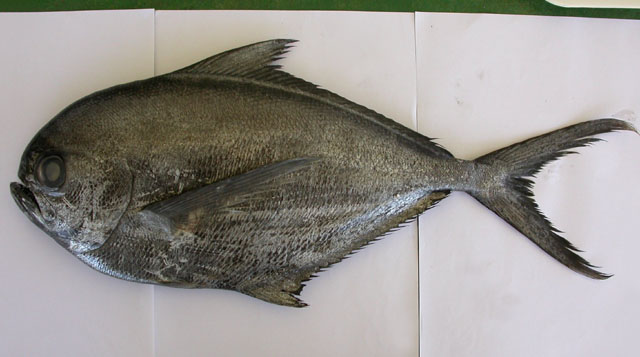| Bramidae (Pomfrets) |
| 100 cm TL (male/unsexed); max.weight: 6,000.0 g; max. reported age: 9 years |
|
pelagic-neritic; marine; depth range 0 - 1000 m, oceanodromous |
| Atlantic, Indian and South Pacific (Ref. 47377). Western Atlantic: Nova Scotia, Canada and Bermuda (Ref. 7251) to Belize and the Antilles (Ref. 26340). Also found in Brazil (Ref. 47377) and in Argentine (Ref. 2806). Eastern Atlantic: central Norway (Ref. 6697) southward to Algoa Bay, South Africa (Ref. 4388). Highly migratory species. |
|
Dorsal spines (total): 0-0; Dorsal soft rays (total): 35-38; Anal spines: 0-0; Anal soft rays: 29-32; Vertebrae: 41-45. Compressed, deep body with a steeply curved head profile (Ref. 33616). Dorsal and anal fins scaled and with rigid fin rays (Ref. 35388). |
| An oceanic and epipelagic species, also found to 1,000 m depth (Ref. 27121). Occasionally comes close to shore (Ref. 9563). Seasonal migrant occurring in small schools, movements apparently temperature-related. Opportunistic feeder on small fishes, cephalopods, amphipods, and euphausiids. Sold fresh and frozen; eaten steamed, fried, broiled and baked (Ref. 9988). |
|
Least Concern (LC); Date assessed: 22 May 2013 Ref. (130435)
|
| harmless |
Source and more info: www.fishbase.org. For personal, classroom, and other internal use only. Not for publication.
